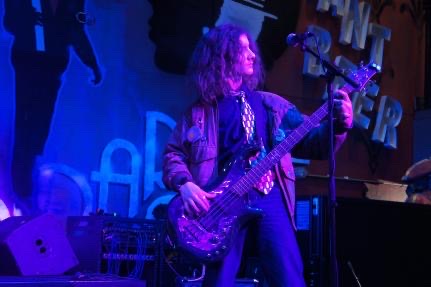The impact of underground artists on communities, an influence we don’t always recognize

Ottar Blumenfeld, a local musician and South student, performing at the “Pourhouse”, in January of 2020. “When you perform it puts an influence on the community… it definitely has an impact on you.”
November 22, 2022
Similar to supporting small businesses, or buying produce from a local farmers market, supporting emerging musicians and local bands can have a significant impact on a community. It can personally impact the artists, their connections in the music industry, their musical growth and development, and even help unify communities. It also allows individuals to discover new and interesting music. There’s influence across the board for musicians and listeners alike. “It definitely brings musicians together at the very least,” says Ottar Blumenfeld, a junior at South High School and member of the band Pyreworks. “Most of the time when you try to start a band you’re not gonna have all the required members so you have to reach out to people you might not know.”
Creating music of your own can lead to discovering others in your position as well. Ava Levy, a 21 year-old musician who makes indie-punk style music in Minneapolis states, “Almost all of the friends that I’ve made are because of the music community.” Levy adds that a noteworthy part of the Minneapolis music scene that she’s come by is the connections she’s made with like minded people, and people who care about the same things.
Not only do the artists influence each other, but the audience as well. Each concert creates its own atmosphere of community, bringing people together more intimately than a massive concert at the US Bank Stadium would. “I’ve never been to a concert where I didn’t meet someone or meet multiple people” says Suzie Anderson, a sophomore at South High with a passion for music and a record of attending concerts. “I’ve actually made one of my best friends [at a concert].” Suzy talks about how the vibe at smaller concerts is very different than larger concerts. “It almost felt like it was a family event.” She comments on how concerts at smaller venues tend to bring a wide variety of people together and expand the community of music and underground artists.
Levy shares this sentiment as well, and discusses not really experiencing this perception of community until being involved in the music scene. “The biggest thing that I’ve gained from it is just having some sense of community.”
Furthermore, having this sense of community can affect the artists’ relationship with themselves. For many, music is a form of expression. An audible art and a meaningful way to convey emotion. Additionally, music can have other advantages for different artists. “It makes me feel like I have some kind of worth,” says Levy. She talks about the impact that her audience and supporters have on her as well. “When there’s more people there it just makes you feel better. It makes you feel more comfortable and it makes you feel like you’re doing something that actually has an impact on other people.”
Many smaller musicians gain viewership from local, hospitable venues, such as The Garage in Burnsville, an all ages venue. Blumenfeld’s first show was performed at The Garage, which led to a second venue extending an invitation to perform only a month in advance. Blumenfeld comments on how popular music today can only go so far in its sound. He mentions how there is new music that hasn’t been brought up yet, and how these new sounds are eventually created through smaller musicians. “Everyone has to start somewhere, and smaller musicians definitely have a lot to bring to the table that maybe hasn’t been considered yet.” Popular artists like Billie Eilish and JuiceWRLD started out on SoundCloud. The Rolling Stones began playing at pubs and clubs in London. Artists aren’t just born with their reputation, it’s something they build. And how do musicians disseminate their work? Through people like you.
Levy adds her own observations of newer artists, especially within Minneapolis. “I think that’s like one of the biggest parts of the Minneapolis music scene is that the majority of people are just like trying it out and are brand new to it,” Levy remarks. “I think that makes it so much more genuine and way less obsessed with fame.”
Besides discovering new music, an additional benefit is the convenience and proximity of most of these shows. Local artists typically play at local venues, which means you’re not sacrificing too much distance to go see them play. Accordingly, these shows usually won’t empty your pockets. “We aren’t huge so it’s not gonna be expensive. It’s like $10 a ticket usually,” Blumenfeld remarks. A way that emerging artists gain viewership is simply by people just coming to their shows. Attending performances and streaming music can really help progress a musician’s trajectory.
Levy notes some important methods of supporting artists; “attending live performances, and if you have the ability to- financially supporting people and buying merch is really important.” She shares how many of the musicians she knows are “dirt poor” and can’t produce their best work because of it. “There’s so many creative people who just haven’t had the money or, like, the resources to gain a platform or have mass viewership,” Levy remarks.“But it doesn’t make their music any less worthy.” Additionally, Levy expresses a dislike for the involvement and presence that social media has in this subject, but acknowledges that it plays a significant role in getting the word out regarding a new or underground artist. “Sharing people’s music on social media is a really great way to kind of proliferate new music.”
Music is an enjoyable and important experience for many. Manifesting as an art, an expression, a self confidence, and an assembly of community for observers and active participants alike. Everyone has to start somewhere, and who knows where these musicians could end up if they’re given the chance.





